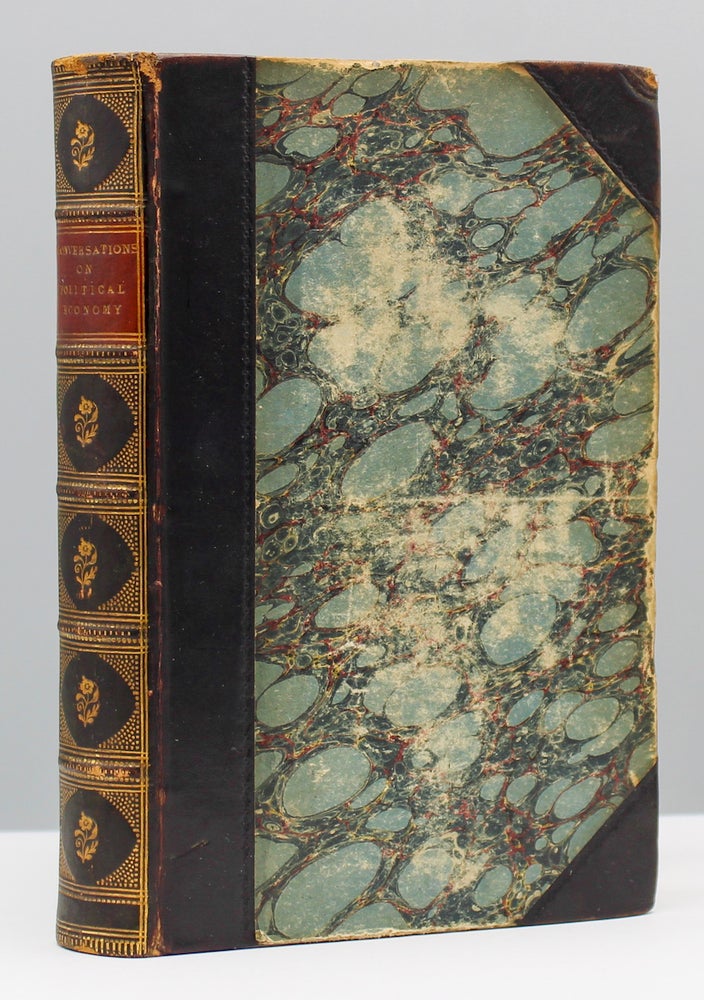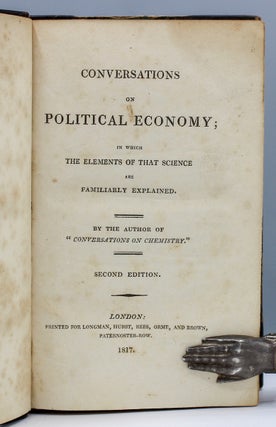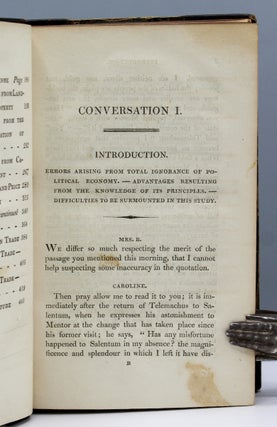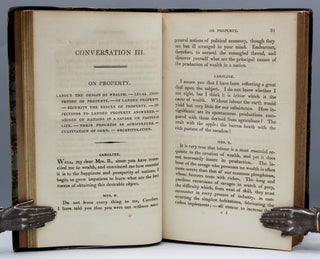Conversations on Political Economy; in which the Elements of that Science are Familiarly Explained.
London: Longman, Hurst, Rees, Orme, and Brown, 1817. Second edition, as stated. First published in 1816. The present work uses the format of a conversation between a teacher and her young pupil Caroline. In the Oxford DNB, Elizabeth J. Morse writes, “Conversations on Political Economy utilized Ricardian principles before the publication of Ricardo’s Principles on Political Economy. “As in all her works Marcet laid no claim to original through, but she wrote in a lucid, pleasant style, incorporating the latest, often controversial, theories in her popular works. Conversations on Political Economy was praised by Macaulay and Say, and was approved by Malthus, McCulloch, and Ricardo. Her confident presentation of complex ideas in the form of appealing dialogue repelled later economists (notably Alfred Marshall) and led others to conclude that hers was economics for schoolgirls (Schumpeter), but the book’s popularity with adult readers grateful for a simple introduction to a new and forbidding field of knowledege indicates Marcet’s accurate perception of a wide and generally sophisticated readership for an introductory economics text.” Macaulay added that “every girl who has read Mrs. Marcet’s little dialogues on political economy could teach Montagu or Walpole many lessons in finance.”. Twentieth century bookplate (Dwight Carpenter) to front pastedown. Contemporary ink signature (Phipps Hornby, probably Sir Admiral Phipps Hornby) to preliminary blank. Some toning and foxing, mostly to first and last few leaves, but overall quite clean throughout. A very good copy. Late nineteenth or early twentieth century half calf over blue marbled boards. Gilt spine with red label. Twelvemo. xii, 485 pp. Item #17431
Jane Haldimand Marcet (1769-1858) was a writer on science and economics and an important figure in the history of women’s education. Her Conversations on Chemistry (1805) was one of the first elementary science textbooks, written after Marcet attended the lectures of Sir Humphry Davy at the Royal Institution. Michael Faraday read it while working as a bookbinder’s apprentice. Though the author insists in the Preface that her knowledge of the subject is “but recent” and she “can have no real claims to the title of chymist,” her work was popular and influential. Marcet was also a friend and colleague of many important women intellectuals, including Maria Edgeworth and Harriet Martineau. Morse notes that Conversations on Political Economy inspired Martineau to begin writing fiction with economic themes, like her Illustrations of Political Economy (1832). Marcet was married to the important physician Alexander Marcet (1770 – 1822). The signature “Phipps Hornby” is likely of Admiral Sir Phipps Hornby (1785 – 1867), a prominent Naval officer who played a vital role in many English victories during the Napoleonic Wars, including the Battle of Lissa. He served under important Naval officers like Horatio Nelson, on the flagship HMS Victory; William Hoste, on the HMS Volage; and the Duke of Northumberland. For a time, he was a commander of the Pacific Fleet, and later one of the Lords of the Admiralty. He concluded his naval career in 1853, but continued to receive honors during his retirement. He was eventually promoted to a full admiral in 1858 and became a Knight Grand Cross of the Order of Bath in 1861.
The Feminist Companion to Literature in English, p. 713.
Price: $1,250.00







